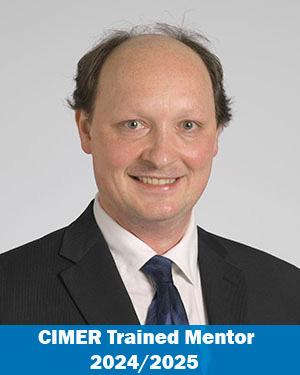Oliver Wessely Laboratory
-
Oliver Wessely Laboratory
- Principal Investigator
- Research
- Our Team
- Publications
- Careers
- Research News
Research
Our multifaceted approach offers unique opportunities to explore many of the unresolved question underlying kidney development and human kidney diseases, to develop novel therapeutic approaches and to shorten the time to translate potential cures from bench to bedside.
Biography
Dr. Wessely is an Associate Staff in the Department of Cardiovascular & Metabolic Sciences in the Lerner Research Institute. Dr. Wessely received his Magister in Molecular Genetics in 1992 and his Ph.D. in Natural Sciences in 1997 from the University of Vienna in Austria. He then continued his research education as a postdoctoral fellow in the laboratory of E. M. De Robertis at UCLA in Los Angeles, CA. In November 2003 he joined the Departments of Cell Biology & Anatomy and Genetics at LSUHSC for his first faculty position. In 2011 he joined the Cleveland Clinic as an Associate Staff, continuing his research on kidney development and disease.
Education & Professional Highlights
University of Vienna
PhD, Natural Sciences
1997
University of Vienna
Magister, Molecular Genetics
1992
"CIMER Trained Mentor" indicates the principal investigator has completed mentorship training based on curriculum from the Center for the Improvement of Mentored Experiences in Research, aimed at advancing mentoring relationships and promoting cultural change in research.
Research
Kidney Development & Disease
The kidney is an essential organ for water and solute homeostasis as well as excretion of waste products. Our research interests lie in the understanding of the molecular mechanisms governing the formation and maintenance of a functional kidney and how these processes are perturbed during diseases such as Polycystic Kidney Disease (PKD), Focal Segmental Glomerulosclerosis (FSGS) and Renal Cell Carcinoma (RCC).
The initial study of kidney development was focused on the role of the RNA-binding molecule Bicc1 in Polycystic Kidney Disease. Since then, we have branched out to multiple aspects of kidney development using both mouse and the amphibian Xenopus as model organisms. In addition, we use human pluripotent stem cells with the aim to study kidney development and diseases in the human setting. In particular, we strive to identify conditions that can drive cells homogenously towards the multiple terminally differentiated renal epithelial cells found in the nephron for regenertive medice approaches and how these cells are maintained in adults and whether endogenous repair mechanisms can be augmented to improve kidney function upon injury or aging. To this end, we use in vivo and in vitro systems and combine them with cutting-edge approaches (e.g. single cell studies, high-dimensional screening) to identify process critical parameters.
Our Team
Selected Publications
- Tran U, Streets AJ, Smith D, Decker E, Kirschfink A, Izem L, Hassey JM, Rutland B, Valluru MK, Bräsen JH, Ott E, Epting D, Eisenberger T, Ong AC*, Bergmann C*, Wessely O*. (2024) BICC1 Interacts with PKD1 and PKD2 to Drive Cystogenesis in ADPKD. bioRxiv [Preprint]. 2024 . PMID: 39253489. *co-corresponding authors
- Kaverina N, Schweickart RA, Chan GC, Maggiore JC, Eng DG, Zeng Y, McKinzie SR, Perry HS, Ali A, O'Connor C, Pereira BMV, Theberge AB, Vaughan JC, Loretz CJ, Chang A, Hukriede NA, Bitzer M, Pippin JW, Wessely O*, Shankland SJ* (2023). Inhibiting NLRP3 signaling in aging podocytes improves their life- and health-span. Aging, ;15(14):6658-6689. PMID: 37487005. *co-corresponding authors
- Veloso Pereira BM, Zeng Y, Maggiore JC, Schweickart RA, Eng DG, Kaverina N, McKinzie SR, Chang A, Loretz CJ, Thieme K, Hukriede NA, Pippin JW, Wessely O*, Shankland SJ.* (2023) Podocyte injury at young age causes premature senescence and worsens glomerular aging. Am J Physiol Renal Physiol. 326(1):F120-F134. PMID: 37855038. *co-corresponding authors
- Shankland SJ*, Jefferson JA, Wessely O* (2023) Repurposing drugs for diseases associated with podocyte dysfunction. Kidney Int, 104(3):455-462. PMID: 37290603. *co-corresponding authors
- Pippin J, Kaverina N, Wang Y, Eng D, Zeng Y, Tran U, Loretz C, Chang A, Akilesh S, Poudel C, Perry SH, O’Connor C, Vaughan JC, Bitzer M, Wessely O*, Shankland S* (2022). Upregulated PD-1 signaling antagonizes glomerular health in aged kidneys and disease. J Clin Invest, 132(16):e156250. PMID: 35968783. * co-corresponding authors
- Fink E, Sona S, Tran U, Desprez P, Bradley M, Qiu H, Eltemamy M, Wee A, Wolkov M, Nicolas M, Min B, Haber G, Wessely, O, Lee B, Ting A (2022). Ureter single-cell and spatial mapping reveal cell types, architecture, and signaling networks. Dev. Cell, 57(15):1899-1916. PMID: 35914526.
- Shankland S, Wang Y, Shaw A, Vaughan J, Pippin J, Wessely O. (2021). Podocyte Aging: Why and How Getting Old Matters. J Am Soc Nephrol. 32(11):2697-2713. PMID: 34716239
- Akbari M, West JD, Doerr N, Kipp KR, Marhamati N, Vuong S, Wang Y, Rinschen MM, Talbot JJ, Wessely O, Weimbs T (2022).Restoration of atypical protein kinase C ζ function in autosomal dominant polycystic kidney disease ameliorates disease progression. Proc Natl Acad Sci U S A, 119(30):e2121267119. PMID: 35867829.
- Zhang B, Tran U, Wessely O. (2018) Polycystin-1 loss of function is directly linked to an imbalance in G-protein signaling in the kidney. Development. 2018, 145(6). PMID: 29530879.
- Signs SA, Fisher RC, Tran U, Chakrabarti S, Sarvestani SK, Xiang S, Liska D, Roche V, Lai W, Gittleman HR, Wessely O, Huang EH. (2018). Stromal miR-20a controls paracrine CXCL8 secretion in colitis and colon cancer. Oncotarget 9(16):13048-13059. PMID: 29560130
- Romaker D., Kumar V., Cerqueira D.M., Cox R.M., Wessely O. (2014) MicroRNAs are critical regulators of tuberous sclerosis complex and mTORC1 activity in the size control of the Xenopus kidney. Proc. Natl. Acad. Sci. USA. 111(17):6335-4. PMID: 24733901
Careers
Training at Lerner Research Institute
Our education and training programs offer hands-on experience at one of the nationʼs top hospitals. Travel, publish in high impact journals and collaborate with investigators to solve real-world biomedical research questions.
Learn MoreResearch News

Drs. Lee, Ting and Wessely will examine human ureter and bladder tissues in males and females at various ages and construct a cellular and molecular anatomical map of the organs.
